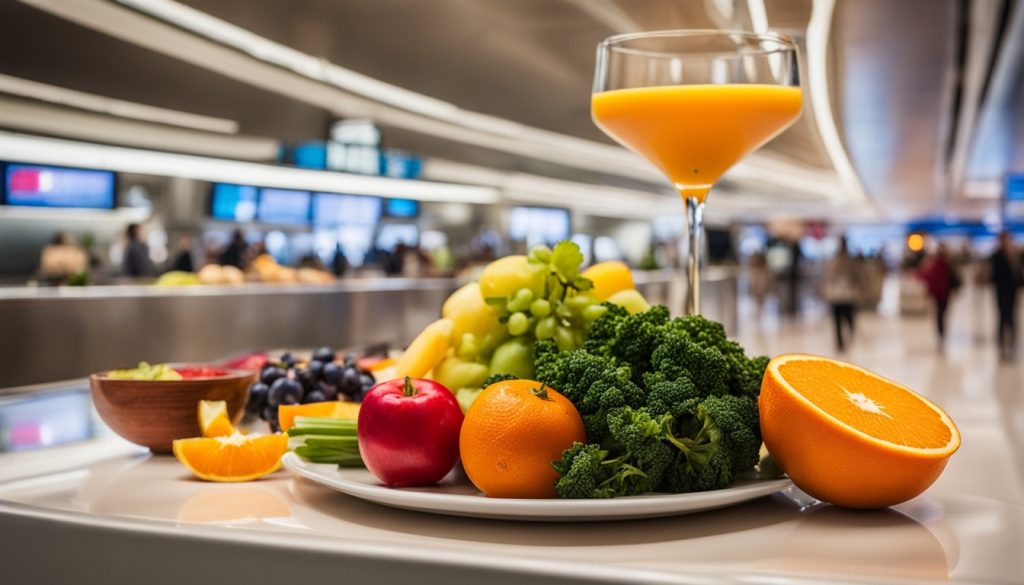Starting a new adventure is thrilling, but it can also bring health challenges. How do you keep up your wellness and enjoy your trip fully? This guide offers key tips to stay healthy, dodge common travel sickness, and boost your immune system for a safe trip.
To stay healthy while traveling, you need to be proactive. This article shares tips on staying hydrated, boosting your immunity, preventing motion sickness, and protecting your skin. It’s packed with practical advice to keep you feeling great on your travels. Whether you’re in a new city or outdoors, you’ll get the insights and tools to handle health issues that come with traveling.
Key Takeaways
- Maintain proper hydration to support your body’s functions during travel
- Incorporate immune-boosting foods and supplements to strengthen your defenses
- Develop strategies to minimize the impact of jet lag and environmental changes
- Pack a comprehensive travel health kit to address potential issues on the go
- Prioritize self-care and stress management to support your mental well-being
Stay Hydrated on the Go
When you travel, it’s key to drink enough water. The air on flights and in new places can dry you out fast. This can make you more likely to get sick. Here are some tips to keep you hydrated on your travels.
Importance of Hydration During Travel
Traveling can dry you out, whether you’re flying, taking a train, or driving. Airplane cabins have very low humidity, and moving around can also use up your water. Drinking enough water keeps you sharp, energetic, and healthy on your trip.
Tips for Staying Hydrated on Flights and Road Trips
- Drink lots of water before, during, and after your trip.
- Avoid drinks with caffeine and alcohol, as they can dry you out more.
- On flights, ask for water often and think about bringing things like electrolyte drinks or powders.
- When driving, stop often to stretch and drink water.
- Carry a refillable water bottle with you everywhere you go.
Using these travel hydration tips will help you stay hydrated while traveling. Whether you’re on a long flight or a long drive, drinking enough water is key. It keeps you healthy and feeling good during your trip.
“Proper hydration is essential for maintaining optimal physical and cognitive function while traveling.”
Boost Your Immunity Before and During Travel
Strengthening your immune system is key to staying healthy while traveling. Focus on immune-boosting foods and supplements. Also, make sure you get enough sleep and exercise. This will help your body fight off illnesses during your travel adventures.
Immune-Boosting Foods and Supplements
Before and during your travel, eat foods that boost your immune system. Include lots of fresh fruits and vegetables, lean proteins, and foods high in probiotics like yogurt and kefir. Think about taking supplements such as vitamin C, zinc, and elderberry to help your body fight off infections.
Getting Enough Sleep and Exercise
It’s important to get enough sleep and stay active during your travel. Try to sleep 7-8 hours each night. Also, do activities like walking, swimming, or light strength training. These keep your body strong and ready to fight off sickness.
“Proper nutrition, adequate sleep, and regular exercise are the cornerstone of a healthy immune system, especially during periods of increased physical and mental stress, like travel.”
Prevent Motion Sickness and Ear Discomfort
Traveling can sometimes be tough, both in how it feels and the bumps you hit along the way. Motion sickness and ear discomfort are common problems that can make your trip less fun. But, there are steps you can take to lessen these issues and make your travel more comfortable.
Before you go, think about what you eat. Choose light, easy-to-digest foods and skip strong smells or reading while you’re moving. On flights, swallowing and yawning can help balance the pressure and stop ear pain. You can also use over-the-counter meds like Dramamine or Bonine for motion sickness.
Drinking plenty of water and getting up to move around can also help. By being proactive, you can avoid motion sickness and ear discomfort. This way, you can enjoy your trip without these problems getting in the way.
“The key to preventing motion sickness and ear discomfort is being prepared and taking proactive steps before and during your journey.”
Everyone is different, so pay attention to what your body needs. With some planning and smart moves, you can avoid motion sickness while traveling and prevent ear pain during travel. This ensures a more comfortable and enjoyable trip.
Stay Healthy While Traveling: Tips for Avoiding Illnesses
Keeping up with hygiene habits and being careful with food and water can really help prevent getting sick on vacation. By taking simple steps, you can lower your chances of getting a foodborne illness or other contagious disease while traveling.
Practicing Good Hygiene Habits
Wash your hands often with soap and water or use an alcohol-based hand sanitizer. Don’t touch your face to stop germs from spreading. Think about bringing disinfecting wipes to clean your hotel room or plane.
Avoiding Contaminated Food and Water
Avoid buffets and raw fruits and veggies unless you peel them yourself. Drink bottled water and skip ice cubes and raw dairy to prevent foodborne illnesses. Look up local food and water safety tips to avoid illness while traveling.
“Prioritizing your health and safety should be a top priority when traveling, and it’s easy to do with a little extra care.”
By using these easy travel hygiene tips, you can make sure your trip is fun and free from illnesses.
Pack a Travel Health Kit
Creating a travel health kit can make you feel more secure. It helps you be ready for minor health issues that might happen on your trip. Make sure to pack these important items to keep you safe.
Essential Medications and First-Aid Supplies
Begin by packing important medicines like pain relievers, antihistamines, and antidiarrheals. Always carry prescription drugs in their original containers with a copy of your prescription. Also, don’t forget first-aid items like bandages, antiseptic ointment, and tweezers for small injuries.
Think about adding these travel health kit essentials based on your destination and activities:
- Sunscreen and insect repellent for skin protection
- Motion sickness remedies for nausea and dizziness
- Antacids or anti-nausea medication for stomach issues
- Rehydration salts or electrolyte-rich drinks to fight dehydration
- Thermometer to check for fever or illness
By packing medications for travel and having first aid items for travelers, you’ll be ready for many health concerns on your trip.
“Preparing a well-stocked travel health kit can give you the confidence to enjoy your journey without worrying about unexpected medical needs.”
Adjust to Local Time and Climate
Traveling across time zones can be tough, but you can ease the jet lag with smart strategies. Here are some tips to help you adjust to new times and stay healthy. These tips will help you beat jet lag and enjoy your trip.
Strategies for Minimizing Jet Lag
When you arrive, get outside in the sun to help your body adjust. Avoid napping, caffeine, and alcohol until you’ve adjusted to the local time. Melatonin supplements can also help with sleep and fight jet lag.
- Stay hydrated by drinking plenty of water throughout your journey
- Engage in light exercise, such as walking or stretching, to help your body adapt
- Maintain a consistent sleep schedule, even if it means adjusting your bedtime gradually
These strategies can make adjusting to a new time zone easier. They help you stay healthy and enjoy your travels more.
“Adjusting to a new time zone can be tough, but with a little preparation, you can beat jet lag and make the most of your trip.”
Protect Your Skin from Sun Damage
Traveling to new places is thrilling, but remember to put sun protection for travelers first. No matter where you go, it’s key to shield your skin from the sun’s dangerous UV rays. With a few easy steps, you can avoid sunburn while traveling and keep your skin looking great on your trip.
Start by using a broad-spectrum sunscreen with an SPF of 30 or higher. Put it on every two hours, or more if you’re in the water or sweating. Keeping your skin safe is crucial for travel skin health.
Also, wear light, loose clothes that cover your skin. A big hat and sunglasses can protect your face and eyes from the sun. Always be careful with skin care tips for travelers during the middle of the day when the sun is strongest.
“Sunscreen is your best defense against sun damage, so never leave home without it, even on cloudy days.”
By using these easy sun protection for travelers tips, you can travel worry-free, knowing your skin is safe. A bit of planning ensures a healthy, fun trip.
Stay Safe and Injury-Free on Outdoor Adventures
Going on outdoor adventures is thrilling, but safety comes first to avoid injuries and have fun. To stay safe on outdoor travel activities, follow a few simple steps. These precautions can change everything.
Start by choosing activities you’re good at. Whether it’s hiking, skiing, or water sports, know your limits. Use the right safety gear, like helmets and life jackets, to prevent injuries while traveling.
Always warm up before you start. This helps get your muscles ready and lowers the chance of getting hurt. Also, drink plenty of water and pay attention to your body if you’re tired or in pain. This can stop you from getting too tired or hurt.
- Choose activities within your skill level
- Use appropriate safety gear, such as helmets, life jackets, and sturdy footwear
- Warm up before physical exertion
- Stay hydrated and listen to your body’s signals
Being aware of your limits and the environment helps you enjoy your outdoor adventures safely and prevent injuries while traveling. Remember, tips for active travel and adventure travel health and safety are essential for a great time.
Be Aware of Environmental Hazards
As adventurous travelers, we love to explore new places. But, we must watch out for environmental health risks. These can include bedbugs and harmful plants and animals.
Avoiding Bedbugs and Other Pests
Bedbugs are a big worry for travelers. They can sneak into even fancy hotels. Always check your room for signs of bedbugs when you arrive.
Keep your bags off the floor and watch for bedbug signs like blood spots. Also, be careful with plants and animals you don’t know. They might cause allergies or infestations.
Keeping your hotel room clean helps protect you from travel illnesses. Being alert and taking steps to avoid pests makes your trip safer and more fun.
Stay Healthy While Traveling: Vaccinations and Medical Advice
Getting ready for international travel is more than packing. A key step is to see a travel medicine specialist before you go. They give advice on vaccines, medicines, and safety tips for your trip.
Visiting a Travel Clinic Before Your Trip
Start planning a few weeks before you leave to get any vaccines you need. Your doctor will also help you manage any health issues you have and find care if you get sick or hurt while away. Seeing a travel medicine expert means you’re fully prepared for international travel and staying healthy.
“Staying healthy while traveling internationally is essential for making the most of your trip. Consulting a travel medicine specialist can help you navigate the necessary preparations to protect your wellbeing.”
Don’t forget to prepare for your health while traveling. Make sure to see a qualified travel medicine specialist. They can give you the advice you need to stay safe and healthy on your trip.
- Identify necessary vaccinations and medications for your destination
- Manage any pre-existing medical conditions while traveling
- Learn how to seek medical care if needed during your trip
By taking these steps, you can enjoy your trip without health worries. Visiting a travel medicine specialist is key to staying healthy while traveling internationally.
Mental Well-Being: Coping with Travel Stress
Traveling can be exciting and broadening, but it can also affect our mental health. Changes in routine, culture shock, and jet lag can make us stressed and anxious. To keep your mind healthy while traveling, focus on relaxing and taking care of yourself.
One key way to handle travel stress is to practice relaxation techniques. Meditation, deep breathing, or journaling can help you calm down. Enjoying hobbies or activities you love is also a great way to relax and reduce stress.
If travel gets too much, it’s okay to take a break. Step back from sightseeing or social events and make time for yourself. You might rest in your room, take a slow walk, or look for local support to help you with the challenges of being away.
Staying in touch with people back home is also important for your mental health. Talk to family and friends, share your stories, and get support from your network. This can make you feel connected and grounded, even in new places.
Remember, managing travel stress and keeping your mental health up is key to a great trip. By relaxing, taking breaks, and staying connected, you can handle culture shock and keep your mental health strong while traveling.
“Traveling is not just about the destination, but the journey itself. Take the time to care for your mental well-being, and you’ll be rewarded with a more enriching and meaningful experience.”
Conclusion
By following the comprehensive travel health tips in this guide, you can keep your health and well-being in check while traveling. These tips cover everything from staying hydrated and boosting your immunity to avoiding common travel illnesses and protecting your skin. They ensure you have a safe and fun trip.
It’s important to plan ahead and pack the right supplies. Also, pay attention to your physical and mental health. With good preparation and a proactive mindset, you can stay healthy and enjoy your travels. By focusing on travel wellness, you’ll be ready for a healthy trip and keep your well-being up while traveling.
Adding these travel health tips to your vacation plans can greatly improve your health and enjoyment. Whether you’re going on a trip within the country or exploring the world, keeping your overall health and safety in mind is crucial for a memorable journey.
FAQ
How can I stay hydrated while traveling?
Drink lots of water before, during, and after your trip. Skip caffeine and alcohol as they can dry you out. Ask for water on flights and take breaks to drink water and stretch during road trips.
What can I do to boost my immune system before and during my trip?
Eat foods that boost your immune system like fruits, veggies, lean proteins, and foods with probiotics. Think about taking supplements like vitamin C, zinc, and elderberry. Make sure you sleep well and exercise to keep your immune system strong.
How can I prevent motion sickness and ear discomfort during travel?
Eat light meals before traveling and avoid strong smells or reading while moving. On flights, swallow and yawn to help your ears pop and prevent pain. You can use over-the-counter meds like Dramamine or Bonine for motion sickness.
What can I do to avoid getting sick while traveling?
Wash your hands often with soap and water or use hand sanitizer. Avoid buffets and raw fruits and veggies unless you peel them yourself. Use bottled water and skip ice cubes and raw dairy products.
What should I include in my travel health kit?
Pack important medicines like pain relievers, antihistamines, and antidiarrheals. Also, bring first-aid items like bandages, antiseptic ointment, and tweezers. Don’t forget sunscreen, bug spray, and remedies for motion sickness, based on where you’re going and what you’ll be doing.
How can I adjust to a new time zone and climate while traveling?
Spend time outside in natural light when you arrive to help adjust your body clock. Avoid napping, caffeine, and alcohol until you’re fully adjusted. Supplements like melatonin can help with sleep. Stay hydrated, exercise, and keep a regular sleep schedule to fight jet lag.
How can I protect my skin from sun damage during my travels?
Use sunscreen with SPF 30 or higher and reapply every two hours, or more if you’re swimming or sweating. Wear light-colored, loose clothing and a hat and sunglasses for protection.
What precautions should I take for outdoor activities while traveling?
Pick activities you’re comfortable with and use the right safety gear like helmets and life jackets. Warm up before you start, drink water, and stop if you feel tired or hurt.
How can I avoid environmental hazards like bedbugs and other pests while traveling?
Check your room for bedbugs when you arrive and keep your bags off the floor and bed. Be careful around unfamiliar plants and animals that could cause allergic reactions or infestations. Use bug spray when needed.
Why should I visit a travel medicine specialist before my trip?
A travel medicine expert can give you advice on vaccines, medicines, and safety tips for your trip. They can help with any health conditions you have and tell you what to do if you get sick or hurt while away.
How can I maintain my mental well-being while traveling?
Make time for relaxing and taking care of yourself, like meditating, writing, or doing hobbies. If you’re feeling overwhelmed, take a break from sightseeing or socializing. Stay in touch with loved ones and look for local support to help manage stress.


